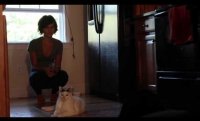Genre: Fiction
The Holidays
Write a scene for a story that takes place at the Thanksgiving day table during dinner or in the kitchen during preparations for the meal with two characters who are are angry at each other but not addressing their conflict directly.
More Chris Ware
The cartoonist and author of the graphic novel Building Stories speaks with Michael Silverblatt on KCRW's Bookworm.
Sara Rauch
Poet, fiction writer, and editor of the literary magazine Cactus Heart, Sara Rauch talks about drawing inspiration from simple things and capturing the beauty of everyday life in writing.
Making Pickles
Jami Attenberg, a recent contributor to the magazine and the author of the new novel The Middlesteins, and Jeffrey Yoskowitz, cofounder of Gefliteria, a boutique purveyor of Old World Jewish foods in Brooklyn, New York, recently got together and made some pickles.
Erdrich Wins National Book Award
Last night at the National Book Foundation gala in New York City, novelist Louise Erdrich was named the recipient of the 2012 National Book Award in fiction. Erdrich, whose latest novel is The Round House (Harper, 2012), will receive $10,000.
This is the first National Book Award for Erdrich, 58, who over the past thirty years has authored fourteen novels and a short story collection, three books of nonfiction, and three poetry collections. The Round House, the second installment in a trilogy, follows an Ojibwe boy as he seeks to avenge his mother's rape. Erdrich, who is part Ojibwe, dedicated her award last night to "the grace and endurance of native people."
"This is a book about a huge case of injustice ongoing on reservations," she added. "Thank you for giving it a wider audience."
In nonfiction, Katherine Boo took the prize for her debut, Beyond the Beautiful Forevers: Life, Death, and Hope in a Mumbai Undercity (Random House, 2012). David Ferry, whose latest collection is Bewilderment: New Poems and Translations (University of Chicago Press, 2012), won the award in poetry. William Alexander won in the young people’s literature category for his young adult novel Goblin Secrets (Margaret K. McElderry, 2012). Each winner receives $10,000.
The awards were given amid recent discussions among publishers and the National Book Foundation that the annual award—one of the most prestigious literary prizes in the United States, second perhaps only to the Pulitzer—had become too insular, and was in need of expanding its image and scope. Finalists in fiction included such names as Dave Eggers and Junot Diaz; the finalists in nonfiction included Robert Caro's Lyndon Johnson series and the late Anthony Shadid's lauded memoir House of Stone (Houghton Mifflin Harcourt, 2012). Honorary prizes were also given to author Elmore Leonard and longtime New York Times publisher and chairman Arthur O. Sulzberger Jr.
Established in 1950, the National Book Awards are given annually for works of poetry, fiction, and nonfiction published in the previous year. For more information, visit the National Book Foundation website.
A Secret Inscription
Write a scene for a story in which one character finds an intimate inscription in his or her partner's book. Who is it from? What does it mean? When was it written? And how does the first character find out the answers to these questions?
Don't Look Back
In his essay “Don’t Look Back” (Poets & Writers Magazine, November/December 2012), fiction writer Benjamin Percy argues against including backstory when writing short stories. “It’s almost always unnecessary," Percy writes. "A reader intuits the history of a character by observing that character act in the present.” Choose a story you’ve written and delete all of the backstory that you’ve included. Then revise it by describing the main character and having that description convey the backstory instead.
University of New Orleans
Sam Pink
"And I realized that part of my problem was I visibly resembled an adult." The latest installment of Recommended Reading's Single Sentence Animations is Brandon Ray's animation of a line from "Rontel" by Sam Pink, with music by Makestapes.





![Chris Ware on Bookworm [2012]](https://www.pw.org/files/styles/video_thumb_medium/public/media-oembed/i.ytimg.com/vi/cxsMhhHRtJE/hqdefault.jpg?itok=7Wn_UwfU)


